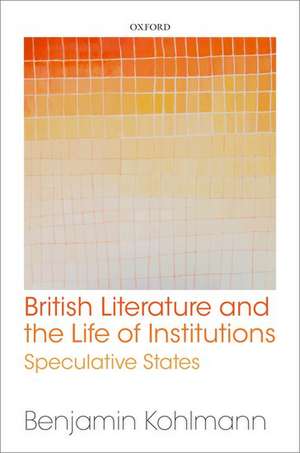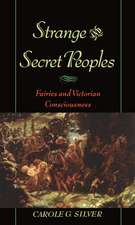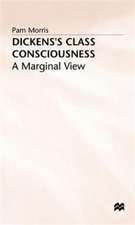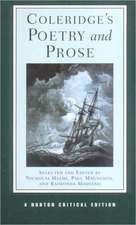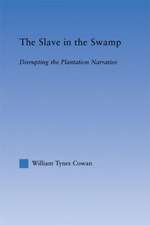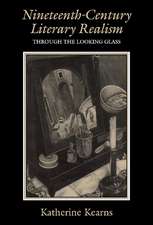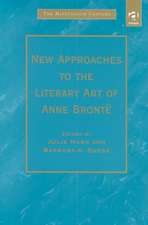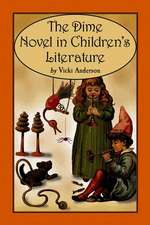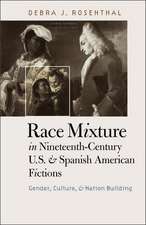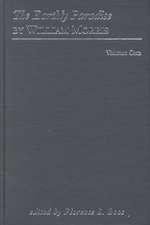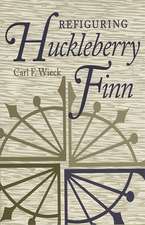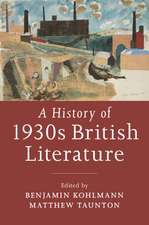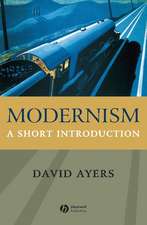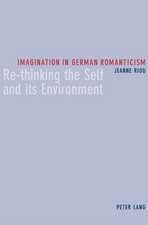British Literature and the Life of Institutions: Speculative States
Autor Benjamin Kohlmannen Limba Engleză Hardback – 30 noi 2021
Preț: 523.10 lei
Preț vechi: 655.47 lei
-20% Nou
Puncte Express: 785
Preț estimativ în valută:
100.09€ • 104.30$ • 82.88£
100.09€ • 104.30$ • 82.88£
Carte disponibilă
Livrare economică 03-08 martie
Preluare comenzi: 021 569.72.76
Specificații
ISBN-13: 9780198836179
ISBN-10: 0198836171
Pagini: 288
Dimensiuni: 164 x 242 x 22 mm
Greutate: 0.56 kg
Editura: OUP OXFORD
Colecția OUP Oxford
Locul publicării:Oxford, United Kingdom
ISBN-10: 0198836171
Pagini: 288
Dimensiuni: 164 x 242 x 22 mm
Greutate: 0.56 kg
Editura: OUP OXFORD
Colecția OUP Oxford
Locul publicării:Oxford, United Kingdom
Recenzii
An important contribution to the literary and intellectual history of Britain in the late nineteenth and early twentieth centuries, as well as to contemporary debates on critique and post-critique. Focusing on a constellation of thinkers and writers who gave voice to a reformist imaginary, Kohlmann helps us to think about reform and the state anew. A powerful defense of the slow politics of progressive reform informed by aspirations to live otherwise.
British Literature and the Life of Institutions is a serious achievement: a genuinely important contribution not only to Victorian and modernist literary studies, but to the wider conversation about literature and critique today. By bringing back into play a much more positive conception of the state's role in our lives than has dominated cultural criticism in recent decades, Kohlmann gives depth and analytic edge to accounts of political reformism, restoring a vocabulary for 'long revolutionary' commitments to a more egalitarian society. Victorian and Edwardian literature look different in the light of his readings; so too does the long arc of argument over the nature and scope of criticism's commitments through the twentieth century and into the twenty-first.
An irreplaceable contribution to our understanding of literature and philosophy around 1900--and a model for contemporary scholarship. Meticulously, and with exceptional clarity of view, Kohlmann counters threadbare conceptions of the state as necessarily inflexible, monolithic, and at odds with social life.
A deeply researched, tightly argued, and immensely valuable study. It stands among the strongest contributions to the growing new institutionalism in literary studies...A fascinating treatment of its subject...Makes a case for the importance of thinking institutions differently in the present: this is as much a work of intellectual history and reclamation as of literary scholarship.
I can highly recommend British Literature and the Life of Institutions to scholars interested in debates about social reform past and present.
a set of awesomely researched case studies … dazzling in its command of detail. Other approaches are certainly possible and are strongly exemplified by the work of Fredric Jameson and Raymond Williams. But Kohlmann deserves to be recognized as an original thinker in his own right [...] His book makes a distinctive contribution to the study of social thought in the decades before World War I, and it deserves a lasting readership among scholars wanting to immerse themselves in its materials.
explaining the differences between reform and revolution, Kohlmann sets the stage for an intriguing look into 'Thinking the State (Again)'.... Kohlmann's book is an excellent delve into the economics of around 1900 ... an absolute treat.
There is much to admire about Benjamin Kohlmann's British Literature and the Life of Institutions. ... It provides innovative readings that offer an expansive view of a sustained reformist literary mode cohering around the belief that institutions are part of rather than external to lived social life ... The book provocatively reevaluates a neglected series of debates and a moment within literary history ... Far from being a body of literature that does not speak directly to our present moment, with concerns that need not overly concern us, British Literature and the Life of Institutions gives the lie to that commonplace perception.
While Kohlmann's rigorous and erudite book covers the "intense reformist activity around 1900", it couldn't be more relevant today... As Kohlmann points out, we can't enter the debate, let alone win it, without a language to consider the state as something capable of solving problems. Kohlmann's serious look at these tough questions a century ago helps us understand that we all have a role to play in finding the language to change what is not working.
Speculative States is an ambitious, conceptually rich exploration ... [The book] plays on links between philosophical ideas and their practical formalization into institutional structures and policies, cleverly merging an attitude, a dialectical critical method, and the institutional and literary forms that realize them.... In a new era of increasing authoritarianism, suspicion of the state, challenges to institutionality, and an attendant proliferation of dystopian narratives, Kohlmann's book [is] an invitation to speculate about our own relationship to these ideas and to the past.
British Literature and the Life of Institutions is a serious achievement: a genuinely important contribution not only to Victorian and modernist literary studies, but to the wider conversation about literature and critique today. By bringing back into play a much more positive conception of the state's role in our lives than has dominated cultural criticism in recent decades, Kohlmann gives depth and analytic edge to accounts of political reformism, restoring a vocabulary for 'long revolutionary' commitments to a more egalitarian society. Victorian and Edwardian literature look different in the light of his readings; so too does the long arc of argument over the nature and scope of criticism's commitments through the twentieth century and into the twenty-first.
An irreplaceable contribution to our understanding of literature and philosophy around 1900--and a model for contemporary scholarship. Meticulously, and with exceptional clarity of view, Kohlmann counters threadbare conceptions of the state as necessarily inflexible, monolithic, and at odds with social life.
A deeply researched, tightly argued, and immensely valuable study. It stands among the strongest contributions to the growing new institutionalism in literary studies...A fascinating treatment of its subject...Makes a case for the importance of thinking institutions differently in the present: this is as much a work of intellectual history and reclamation as of literary scholarship.
I can highly recommend British Literature and the Life of Institutions to scholars interested in debates about social reform past and present.
a set of awesomely researched case studies … dazzling in its command of detail. Other approaches are certainly possible and are strongly exemplified by the work of Fredric Jameson and Raymond Williams. But Kohlmann deserves to be recognized as an original thinker in his own right [...] His book makes a distinctive contribution to the study of social thought in the decades before World War I, and it deserves a lasting readership among scholars wanting to immerse themselves in its materials.
explaining the differences between reform and revolution, Kohlmann sets the stage for an intriguing look into 'Thinking the State (Again)'.... Kohlmann's book is an excellent delve into the economics of around 1900 ... an absolute treat.
There is much to admire about Benjamin Kohlmann's British Literature and the Life of Institutions. ... It provides innovative readings that offer an expansive view of a sustained reformist literary mode cohering around the belief that institutions are part of rather than external to lived social life ... The book provocatively reevaluates a neglected series of debates and a moment within literary history ... Far from being a body of literature that does not speak directly to our present moment, with concerns that need not overly concern us, British Literature and the Life of Institutions gives the lie to that commonplace perception.
While Kohlmann's rigorous and erudite book covers the "intense reformist activity around 1900", it couldn't be more relevant today... As Kohlmann points out, we can't enter the debate, let alone win it, without a language to consider the state as something capable of solving problems. Kohlmann's serious look at these tough questions a century ago helps us understand that we all have a role to play in finding the language to change what is not working.
Speculative States is an ambitious, conceptually rich exploration ... [The book] plays on links between philosophical ideas and their practical formalization into institutional structures and policies, cleverly merging an attitude, a dialectical critical method, and the institutional and literary forms that realize them.... In a new era of increasing authoritarianism, suspicion of the state, challenges to institutionality, and an attendant proliferation of dystopian narratives, Kohlmann's book [is] an invitation to speculate about our own relationship to these ideas and to the past.
Notă biografică
Benjamin Kohlmann teaches English literature at the University of Regensburg. His first monograph, Committed Styles: Modernism, Politics, and Left-Wing Literature in the 1930s, was published by Oxford University Press in 2014. With Matthew Taunton he is co-editor of A History of 1930s British Literature (CUP, 2019), and his articles have been published in PMLA, ELH, Modern Fiction Studies, Novel, and other journals.
